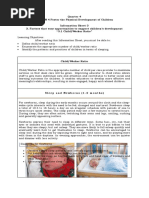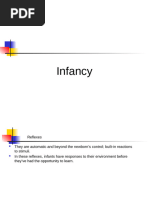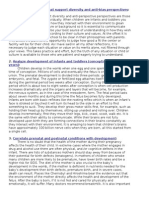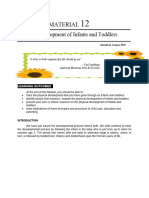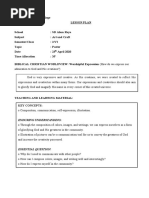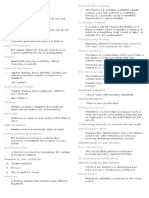MARQUEZ
MARQUEZ
Uploaded by
Alex MarquezCopyright:
Available Formats
MARQUEZ
MARQUEZ
Uploaded by
Alex MarquezOriginal Title
Copyright
Available Formats
Share this document
Did you find this document useful?
Is this content inappropriate?
Copyright:
Available Formats
MARQUEZ
MARQUEZ
Uploaded by
Alex MarquezCopyright:
Available Formats
Alexandra Marquez
11604319
GEPSYCH HW 2
QUESTIONS:
1. How much time do infants spend in sleeping? Why do they sleep this long?
2. Infants show a lot of reflexes after they are born. What purpose are these reflexes for? When
infants show reflexes, what do these indicate?
3. Enumerate the different types of cries infants use to communicate.
4. What is infantile amnesia? Why does this happen?
5. What is object permanence? When does this happen? What does this indicate about the infant?
6. In what best way do infants learn to speak? How many languages can infants learn?
Answers:
1. Generally, newborns sleep about 8 to 9 hours in the daytime and about 8 hours at night.
Most babies do not begin sleeping through the night (6 to 8 hours) without waking until at
least 3 months of age, or until they weigh 12 to 13 pounds. However, this varies
considerably and some babies do not sleep through the night until closer to 1 year.
Newborns and young infants have a small stomach and must wake every few hours to eat.
In most cases, your baby will awaken and be ready to eat about every 3 hours. How often
your baby will eat depends on what he or she is being fed and his or her age.
Some babies sleep too much because they have jaundice or are not getting enough food
https://www.stanfordchildrens.org/en/topic/default?id=newborn-sleep-patterns-90-
P02632&sa=U&ei=58e3VM6CIIr5yATNnIGwAg&ved=0CG8QFjAT&usg=AFQjCNFvyKhlh5_8yF
ZvCBirEv-fTY56pQ https://www.medicalnewstoday.com/articles/322565.php
2. Reflexes are involuntary movements or actions. Some movements are spontaneous and
occur as part of the baby's normal activity. Others are responses to certain actions.
Healthcare providers check reflexes to determine if the brain and nervous system are
working well. Some reflexes occur only in specific periods of development
https://www.urmc.rochester.edu/encyclopedia/content.aspx?ContentTypeID=90&ContentID=P02630
3. Emumerate the diff cries of a baby
1. I'm hungry
2. I'm tired or uncomfortable
3. I've had enough
4. I'm bored
5. I've got colic
6. I'm sick
https://www.whattoexpect.com/first-year/week-10/decoding-cries.aspx
4. Infantile amnesia and why does it happen?
By the time children are two years old, they are able to answer questions about recent
events although they often need careful prompting to retrieve memories. Over the next
four or five years, children become better at recalling and describing important events in
their lives. By the age of seven or eight, most children have well-developed
autobiographical memories with the same rate of normal forgetting seen in adults.
- Freud's theory that childhood amnesia is caused by repression of traumatic memories
occuring in the child's early psychosexual development. More modern theorists, however,
argue that the key to forgetting lies in the early development of the brain itself. While
young children and even infants appear able to recall information for weeks or months,
linking those memories to verbal cues is more difficult.
https://www.psychologytoday.com/us/blog/media-spotlight/201404/exploring-childhood-
amnesia
5. Object permanence is a cognitive skill that develops in babies shortly after object
recognition, which is when infants can recognize familiar objects like a favorite book, stuffed
animal or toy. Babies learn object recognition when they're around 3 months old, after they
can identify their parents' and other primary caregivers' faces at about 2 months old. Babies
can recognize faces earlier than any other kind of object or pattern.
https://www.verywellmind.com/what-is-object-permanence-2795405
6. Research shows babies begin to learn language sounds before they’re even born. In the
womb, a mother’s voice is one of the most prominent sounds an unborn baby hears. By the
time they’re born, newborns can not only tell the difference between their mother’s
language and another language, but also show a capability of distinguishing between
languages. At birth, the baby brain has an unusual gift: it can tell the difference between all
800 sounds. This means that at this stage infants can learn any language that they’re
exposed to. Gradually babies figure out which sounds they are hearing the most.
7. Babies from monolingual English households are specialized to process the sounds of
English, and not the sounds of Spanish, an unfamiliar language. Babies from bilingual
Spanish-English households are specialized to process the sounds of both languages, Spanish
and English. So when a three-year-old growing up in a bilingual household inserts Spanish
words into his English sentences, conventional wisdom assumes that he is confusing the two
languages. If a child does not have enough exposure to the target language, they cannot
become fluent. Therefore by adding too many languages at once, you risk not having
enough exposure to each of them. This could mean your child can speak 3, 4, 5 or even 6
languages, but is not actually fluent in one of them.
If a child does not have the language resources necessary to help language learning, they
cannot become fluent
https://bilingualkidspot.com/2018/01/15/how-many-languages-can-children-learn-same-
time/
You might also like
- NullDocument1,450 pagesNullkefuoekenny100% (1)
- Ota Watertown Si Clinical Assessment WorksheetDocument4 pagesOta Watertown Si Clinical Assessment WorksheetPaulina100% (1)
- Fast 7C PDFDocument2 pagesFast 7C PDFEduardoNo ratings yet
- Cognitive Development of Infants and ToddlersDocument21 pagesCognitive Development of Infants and Toddlersmae fuyonan100% (7)
- No-Cry Baby Solution for Tired Parents - Discover How to Help Your Baby to Sleep Through the Night, and Have Amazing Sleep from Day One (from Newborn to School Age)From EverandNo-Cry Baby Solution for Tired Parents - Discover How to Help Your Baby to Sleep Through the Night, and Have Amazing Sleep from Day One (from Newborn to School Age)Rating: 1 out of 5 stars1/5 (1)
- Meeks Lifespan Development Exam 1 ReviewDocument8 pagesMeeks Lifespan Development Exam 1 Reviewdick mgeeNo ratings yet
- SPGN 251 Lesson Modification Project FinalDocument8 pagesSPGN 251 Lesson Modification Project Finalapi-494929426No ratings yet
- InstructionalDocument8 pagesInstructionalDarwin Tumabini SenoNo ratings yet
- Module 3Document10 pagesModule 3ramonjr.vencioNo ratings yet
- 1SF Educ 111 Modue 4 Lesson 2Document3 pages1SF Educ 111 Modue 4 Lesson 2Ella Marie AlbutraNo ratings yet
- EbookDocument9 pagesEbookod armyNo ratings yet
- Sleep Training: The Exhausted Parent's Guide on How to Effectively Establish Good Baby Sleep HabitsFrom EverandSleep Training: The Exhausted Parent's Guide on How to Effectively Establish Good Baby Sleep HabitsNo ratings yet
- Child DevelopmentDocument25 pagesChild Developmentrojejo8918No ratings yet
- Hocken BerryDocument4 pagesHocken BerryMuthahharahNo ratings yet
- Infant Brain Development 1Document33 pagesInfant Brain Development 1parentese100% (1)
- Chap 3 PsyDocument15 pagesChap 3 PsyFariaa ZubairNo ratings yet
- InfancyDocument51 pagesInfancyrayyanurabiunagogoNo ratings yet
- 123 EducDocument5 pages123 EducTitus NumerousNo ratings yet
- Topic 3 (A) .Infancy - DevelopmentDocument24 pagesTopic 3 (A) .Infancy - DevelopmentYeeyuan ChongNo ratings yet
- Chapter 3 First Three Years Devt Psych 075108Document22 pagesChapter 3 First Three Years Devt Psych 075108Mark AndreiNo ratings yet
- Unit IX - Answer Key Developmental Psychology: Module 45 - Developmental Issues, Prenatal Development, and The NewbornDocument44 pagesUnit IX - Answer Key Developmental Psychology: Module 45 - Developmental Issues, Prenatal Development, and The NewbornReseNo ratings yet
- unit 4Document32 pagesunit 4NIHARIKA BORGOHAINNo ratings yet
- InfancyDocument51 pagesInfancybettyalishaf.001No ratings yet
- Inbound 4165045281536904977Document31 pagesInbound 4165045281536904977Aeron Lorenz BustamanteNo ratings yet
- Module 3. Stages of Human Development: at The End of This Module, You Will Be Able ToDocument7 pagesModule 3. Stages of Human Development: at The End of This Module, You Will Be Able ToRheamar Angel MolinaNo ratings yet
- D4 InfanciaDocument3 pagesD4 InfanciaPedroPocasNo ratings yet
- Free Ebook Sleep Guide For Newborns Toddlers 2014Document28 pagesFree Ebook Sleep Guide For Newborns Toddlers 2014Cleber de Souza GutierrezNo ratings yet
- MODULE 7 - Infancy and ToddlerhoodDocument22 pagesMODULE 7 - Infancy and ToddlerhoodRachelle DalingNo ratings yet
- How Babies Learn LanguageDocument9 pagesHow Babies Learn Languagesurajit_roy100% (1)
- National Sleep Foundation - Sleep Duration RecommendationsDocument2 pagesNational Sleep Foundation - Sleep Duration RecommendationsSandra PaivaNo ratings yet
- Learning Material 6. DCAD - Physical, Cognitive, Social and Emotional Dimension (Infancy Toddlerhood)Document24 pagesLearning Material 6. DCAD - Physical, Cognitive, Social and Emotional Dimension (Infancy Toddlerhood)Gio ManuelNo ratings yet
- Development The First YearDocument10 pagesDevelopment The First YearelyaskhanNo ratings yet
- The Mystery of ... BABIES: 107 Amazing Clues to Solving the Questions We Yearn to KnowFrom EverandThe Mystery of ... BABIES: 107 Amazing Clues to Solving the Questions We Yearn to KnowNo ratings yet
- InfancyDocument64 pagesInfancysiddiquimahrukh82No ratings yet
- 4 InfancyDocument47 pages4 InfancyMary Joyce TalamanteNo ratings yet
- Cephalocaudal and Proximodistal PatternsDocument9 pagesCephalocaudal and Proximodistal PatternsDan Gela Mæ MaYoNo ratings yet
- The Happy Sleeper: The Science-Backed Guide to Helping Your Baby Get a Good Night's Sleep-Newborn to School AgeFrom EverandThe Happy Sleeper: The Science-Backed Guide to Helping Your Baby Get a Good Night's Sleep-Newborn to School AgeNo ratings yet
- First Steps To Achieve Your ObjectiveDocument2 pagesFirst Steps To Achieve Your ObjectiveMarc Jamel ROdriguezNo ratings yet
- 05: Cognitive Development in The Toddler and Preschool YearsDocument9 pages05: Cognitive Development in The Toddler and Preschool YearsŞterbeţ RuxandraNo ratings yet
- Cuestionario Secret Life of BabiesDocument3 pagesCuestionario Secret Life of BabiesMaría Catalina BeneventiNo ratings yet
- The Lull-A-Baby Sleep Guide 1: The No-Cry Sleep Solution for Your BabyFrom EverandThe Lull-A-Baby Sleep Guide 1: The No-Cry Sleep Solution for Your BabyNo ratings yet
- Integrate Strategies That Support Diversity and Anti-Bias PerspectivesDocument4 pagesIntegrate Strategies That Support Diversity and Anti-Bias Perspectivesapi-267528958No ratings yet
- ToddlerDocument11 pagesToddlerLian QuilbioNo ratings yet
- Enterprnur Assignment Research NoteDocument28 pagesEnterprnur Assignment Research NotetworkeafrhuNo ratings yet
- Child and Adolescent DevelopmentDocument14 pagesChild and Adolescent DevelopmentMa Selina RubioNo ratings yet
- Part II Development of The Learners at Various Stage Physical Development of Infant and Toddlers PDFDocument24 pagesPart II Development of The Learners at Various Stage Physical Development of Infant and Toddlers PDFEvangeline Pederoso SolomonNo ratings yet
- 04: Cognitive Development in The First Year: Student ObjectivesDocument8 pages04: Cognitive Development in The First Year: Student ObjectivesŞterbeţ RuxandraNo ratings yet
- PRED 2011 - 1 Physical Dev. of I&TDocument13 pagesPRED 2011 - 1 Physical Dev. of I&TGyzyl GazoNo ratings yet
- Growth and Development of ToddlersDocument6 pagesGrowth and Development of ToddlersJilleane Pascual100% (2)
- MODULE 5 Infant and Toddler DevelopmentDocument13 pagesMODULE 5 Infant and Toddler DevelopmentIVY JEAN IDPALINA IDONo ratings yet
- Mod 6 Dev PsychDocument12 pagesMod 6 Dev PsychajgempesoNo ratings yet
- Infancy Is The Shortest of All Developmental PeriodsDocument18 pagesInfancy Is The Shortest of All Developmental PeriodsaliNo ratings yet
- Resumen T5Document8 pagesResumen T5edeniablancogariaNo ratings yet
- Identifying Cerebral PalsyDocument259 pagesIdentifying Cerebral PalsyFatema Shafiqul ShoshiNo ratings yet
- Baby Sleeping Book for Tired Parents: Soft baby sleep is no child's play (Baby sleep guideTips for falling asleep and sleeping through in the 1st year of life)From EverandBaby Sleeping Book for Tired Parents: Soft baby sleep is no child's play (Baby sleep guideTips for falling asleep and sleeping through in the 1st year of life)Rating: 5 out of 5 stars5/5 (4)
- Sleep Regression Survival Guide-Fi33515972Document7 pagesSleep Regression Survival Guide-Fi33515972Priscila BarbosaNo ratings yet
- Chapter 2 - InfancyDocument4 pagesChapter 2 - InfancySilvia RodriguezNo ratings yet
- Summary of Tracy Hogg with Melinda Blau's Secrets of the Baby WhispererFrom EverandSummary of Tracy Hogg with Melinda Blau's Secrets of the Baby WhispererNo ratings yet
- Technological University of The Philippines: College of Industrial Education Home Economics DepartmentDocument20 pagesTechnological University of The Philippines: College of Industrial Education Home Economics DepartmentKiel Richjen AbanganNo ratings yet
- Educ 101.module 12Document10 pagesEduc 101.module 12Avigale VelascoNo ratings yet
- Ece 101 Script PDFDocument7 pagesEce 101 Script PDFAlthea FabelloNo ratings yet
- Infancy, Thenewborn, and Infant Development: Mendoza, Jnymelrose Delacruz, Janella Rebogbog, Dianne Savari, DannyroseDocument24 pagesInfancy, Thenewborn, and Infant Development: Mendoza, Jnymelrose Delacruz, Janella Rebogbog, Dianne Savari, DannyroseHyacinth AlexaNo ratings yet
- DDG MindMapDocument1 pageDDG MindMapram179No ratings yet
- Drawing Assessment CriteriaDocument1 pageDrawing Assessment Criteriaapi-254314751No ratings yet
- Vocab Quiz-Chap 4-Sens & PercDocument3 pagesVocab Quiz-Chap 4-Sens & PercJanie VandeBergNo ratings yet
- Matrix of Curriculum Standards (Competencies), With Corresponding Recommended Flexible Learning Delivery Mode and Materials Per Grading PeriodDocument4 pagesMatrix of Curriculum Standards (Competencies), With Corresponding Recommended Flexible Learning Delivery Mode and Materials Per Grading PeriodAjoc Grumez Irene92% (13)
- Detailed AnalysisDocument6 pagesDetailed AnalysisAditya100% (1)
- Student S Name Year of Study Career Pre-SpecializationDocument2 pagesStudent S Name Year of Study Career Pre-SpecializationnikitaaraujoNo ratings yet
- A. B. C. A. B. C.: Makiling Integrated School 11 Editha B. Robillos Cpar NOVEMBER 25-28, 2019 2 Semester 1 QuarterDocument2 pagesA. B. C. A. B. C.: Makiling Integrated School 11 Editha B. Robillos Cpar NOVEMBER 25-28, 2019 2 Semester 1 QuarterEditha BalolongNo ratings yet
- The Mini-Mental State ExamDocument2 pagesThe Mini-Mental State ExamInna DamaNo ratings yet
- Penerapan Media Animasi Untuk Meningkatkan Minat Belajar Peserta Didik Pada Mata Pelajaran Geografi Di Sma Pgii 2 BandungDocument10 pagesPenerapan Media Animasi Untuk Meningkatkan Minat Belajar Peserta Didik Pada Mata Pelajaran Geografi Di Sma Pgii 2 Bandungharyo suharjoNo ratings yet
- Techniques in Selecting and Organizing InformationDocument3 pagesTechniques in Selecting and Organizing InformationMylen Noel Elgincolin Manlapaz100% (4)
- Research in MTB MLEDocument5 pagesResearch in MTB MLEAnonymous SlXyTZxq5No ratings yet
- The Male Brain, The Female Brain PDFDocument4 pagesThe Male Brain, The Female Brain PDFenavsantosNo ratings yet
- DRUGSDocument2 pagesDRUGSMariel CortezNo ratings yet
- VarkDocument3 pagesVarkDavid ReyesNo ratings yet
- Long Quiz 3Document12 pagesLong Quiz 3Lhey SambatNo ratings yet
- 3-Step Plan For Turning Weaknesses Into StrengthsDocument2 pages3-Step Plan For Turning Weaknesses Into StrengthsClaudia BNo ratings yet
- Nanik Margaret Tarihoran - 01307170048 - Lesson Plan PSAL Art - Grade 6 - Poster (Making Poster) - DikonversiDocument12 pagesNanik Margaret Tarihoran - 01307170048 - Lesson Plan PSAL Art - Grade 6 - Poster (Making Poster) - DikonversiNanik TarihoranNo ratings yet
- Bloom's Revised Taxonomy Model The Knowledge Dimension: FactualDocument4 pagesBloom's Revised Taxonomy Model The Knowledge Dimension: FactualJomark RebolledoNo ratings yet
- DepEd NEAP NTOT Grade 11 Lesson Plan.1Document46 pagesDepEd NEAP NTOT Grade 11 Lesson Plan.1Cris A. MatiningNo ratings yet
- Methods of Teaching GrammarDocument12 pagesMethods of Teaching GrammarVaisakhi Visakh94% (35)
- Soc Psy Chap 3-4Document3 pagesSoc Psy Chap 3-4angela hernandezNo ratings yet
- The Expert System Research PaperDocument5 pagesThe Expert System Research Paperapi-240314948No ratings yet
- Nome: Carolina Haruko Saito Letras - Inglês UAM/1º SemestreDocument1 pageNome: Carolina Haruko Saito Letras - Inglês UAM/1º SemestreCarolNo ratings yet
- Transfer of LearningDocument30 pagesTransfer of LearningMei JoyNo ratings yet
- Bivacqua Empathy. Self Other DistinctionDocument11 pagesBivacqua Empathy. Self Other DistinctionState of MindNo ratings yet
- Von Restorff EffectDocument2 pagesVon Restorff EffectValarmathy KunasekaranNo ratings yet








